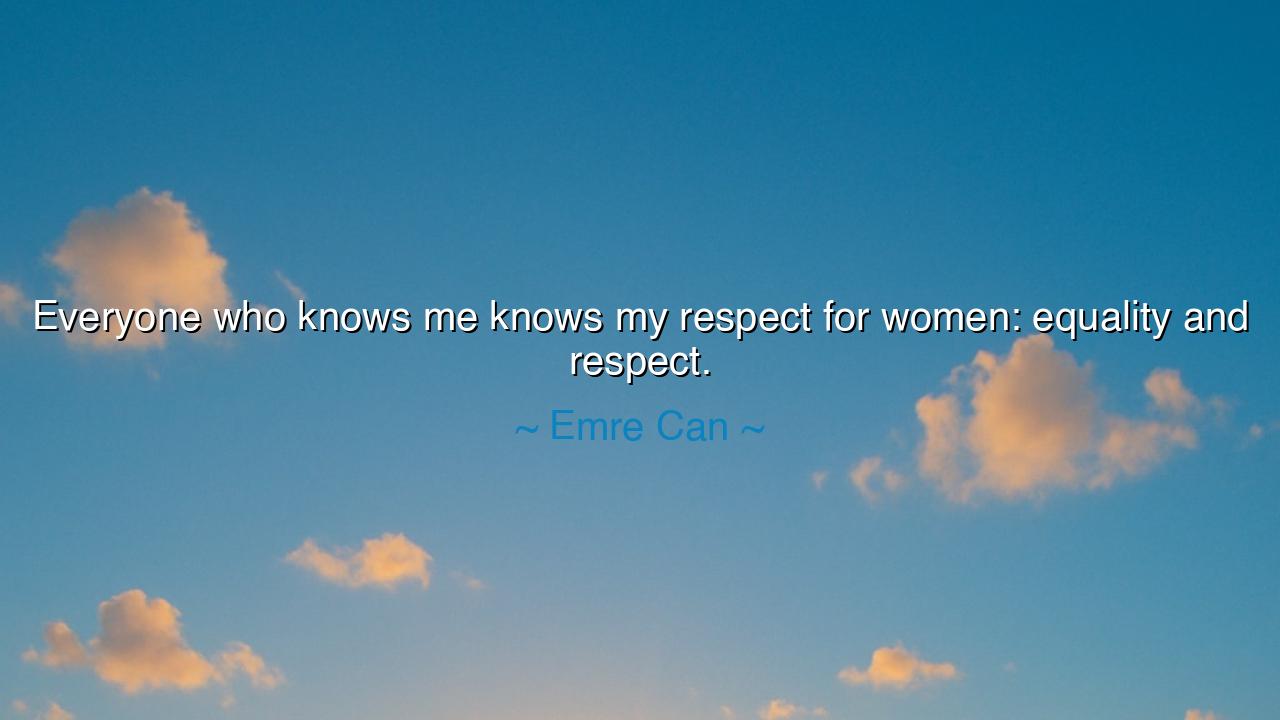
Everyone who knows me knows my respect for women: equality and






Everyone who knows me knows my respect for women: equality and respect—these words, spoken by Emre Can, speak to a principle as old as humanity itself. In a world shaped by centuries of struggle, equality has always been a beacon, guiding the souls of those who yearn for a world where respect is not conditional, where the worth of a person is not measured by their gender but by their humanity. To speak of respect for women is to call upon the very essence of justice, for it is in the recognition of equality that true societal harmony is achieved. These words carry with them a call, not just for understanding, but for action, for change, for the breaking down of barriers that have long stood between men and women in every corner of the world.
In the ancient days, before the modern systems of governance, societies were often ruled by the principles of might and dominance. But even in those times, there were figures who rose above the rigid expectations of their eras. The great Queen Hatshepsut of Egypt, who ruled as Pharaoh during the 15th century BCE, defied the conventional notions of gender and took her place among the greatest rulers of history. Her reign was marked by both political and economic success, a testament to the fact that a leader’s worth is determined not by their gender, but by their vision, wisdom, and integrity. In acknowledging and respecting women, she left a legacy that would endure long after her reign, a symbol of what is possible when equality is embraced.
In the context of the modern world, the words of Emre Can remind us of the power of respect as a foundation for progress. The battle for gender equality is not just a historical struggle, but a living, breathing force that requires the active participation of each generation. When we speak of respect for women, we speak not only of honoring them for their roles as mothers, daughters, and sisters, but as leaders, thinkers, creators, and warriors of change. We honor their contributions to society, which span the realms of science, art, politics, and beyond. And we commit ourselves to ensuring that their voices are heard, that their opportunities are not limited, and that their contributions are recognized on equal footing with those of men.
Consider the example of Malala Yousafzai, whose name has become synonymous with the fight for education and equality for girls and women around the world. Malala, despite the dangers she faced, stood up for the right of every girl to learn, to be free, and to live with dignity. Her courage in the face of violence, her determination to speak for those who cannot, is a direct reflection of the kind of respect for women that Emre Can speaks of. In her bravery, she embodies the very idea that the equality of women is not a luxury, but a necessity—a necessity that will shape the future of our world for generations to come.
The words of Emre Can are not just an expression of personal belief; they are a call to action. Respect for women must not be confined to words alone. It is a principle that demands to be woven into the very fabric of our lives, from the family unit to the workplace, from the halls of power to the streets where we live. In every interaction, in every decision, we must ask ourselves: are we treating women with the respect they deserve? Are we upholding the values of equality in our communities, ensuring that no woman is held back by the limits imposed on her by outdated norms or oppressive systems?
True respect for women is not simply about admiration; it is about action. It is about advocating for equal rights in all spheres of life—education, employment, health care, and beyond. It is about speaking out against the injustices that women face, whether they be in the form of violence, discrimination, or unequal opportunities. It is about lifting up the voices of women, especially those who have been silenced by the forces of oppression. Respect is a living force, and we must each do our part to nourish it and make it grow. Only then can we move closer to the vision of a world where equality is not a distant dream, but a tangible reality for all.
The lesson from Emre Can is clear: respect for women is the cornerstone upon which a just and thriving society is built. When we honor women—when we recognize their rights, strength, and contributions—we not only uplift them, but we elevate the very world we live in. Each of us is called to examine our own actions and attitudes, to ensure that we are creating spaces where women are treated with the dignity and respect they deserve. In doing so, we create a world where equality is not just an aspiration, but a truth that shapes our lives and the lives of future generations.
So, O seekers of justice, take this wisdom to heart. Respect for women is not optional; it is essential. It is the very foundation of a world where all are free to live, to grow, and to contribute without fear of being diminished because of their gender. Let us rise to the challenge, as Emre Can has, and commit ourselves to building a world where equality is a living reality, not just for women, but for all. The time is now. The change begins with us.






AAdministratorAdministrator
Welcome, honored guests. Please leave a comment, we will respond soon